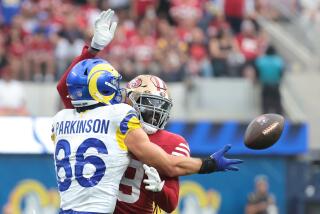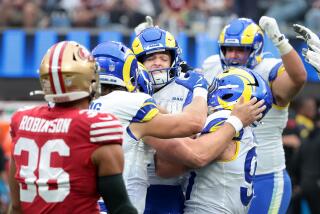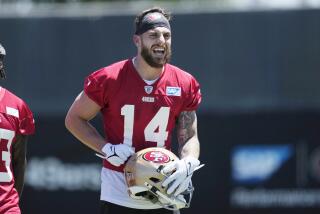49ers Find It Cozy Under Cap : NFL: Financial maneuvers bring team immediate return on investment with berth in Super Bowl XXIX.
- Share via
SANTA CLARA, Calif. — A year ago, Eddie DeBartolo and Carmen Policy rode down an elevator at Texas Stadium after the San Francisco 49ers had lost the NFC championship game to Dallas for the second straight year.
“Do something!” DeBartolo snapped at his longtime pal.
Policy did.
Instead of moaning about the new salary cap, he managed to reduce a payroll of over $50 million to the required $34.6 million and still plugged the defensive gaps that had kept the 49ers from the Super Bowl. His moves were aimed at one thing: beating Dallas in the NFC title game, exactly what the 49ers did last Sunday.
Now they take their six new defensive starters to Miami, where San Francisco can become the first franchise to win five Super Bowls.
To 49ers owner Eddie DeBartolo and team president Carmen Policy, that’s nothing less than their birthright. If Jerry Jones, Tom Benson, Dan Rooney and other owners don’t like it, too bad.
But how do you cut $15 million from its payroll find a way to fill its holes at the same time?
Ask Carmen Policy, “Captain Cap.”
*
Rickey Jackson, Gary Plummer, Richard Dent, Charles Mann, Bart Oates. To 27 other NFL teams, they were good players past their prime, banged up, commanding big salaries for diminishing performances. Just the kind of guys the cap made expendable.
Ken Norton -- a linebacker in his prime and a major part of the defense the 49ers knew they had to beat to get back to the top.
Deion Sanders -- immensely talented, but a showboat, a bigmouth and, worst of all, unreliable. Who wanted a guy who wouldn’t show up until the baseball season ended? The 49ers.
Not only did they sign Norton and all those old guys, but they managed to get Sanders with a lot less money than other teams offered. It changed the face of the defense and turned the 49ers from a team with a laid-back image to a trashing-talking “in-your-face” outfit that even changed the attitude of their coach, George Seifert.
“I’ve had more fun coaching this team than any I’ve ever had,” says Seifert, who learned from his new players that emotion can work as well as cool professionalism, the demeanor of the team through four Super Bowl victories. “These were all character guys who put the team first. Deion most of all.”
*
It started before the end of the 1993 season, the last without a cap.
Outside the NFL, nobody really noticed when commissioner Paul Tagliabue set Dec. 23 as the date for redoing and extending contracts without it counting in 1994. Even less notice was taken of the fact that in 1999, the last year of the collective bargaining agreement, there would be no cap.
Carmen Policy did.
So even while the 49ers were harboring hopes of going to last year’s Super Bowl, Policy and his “capologist,” an accountant named Dominic Corsell, were redoing contracts to extend them into that capless year, even when the beneficiaries would no longer be playing.
Just as important, Seifert and the coaching staff were making decisions on players with whom they could do without.
Like other teams, the evaluation related production to salary with emphasis on the most basic need -- speed on defense, like the Cowboys. Cap aside, they had to draft better to make up for such disappointing high defensive picks as Dana Hall, Ted Washington and Todd Kelly.
Washington, a first-round pick who couldn’t keep his weight down, was the first to go, traded to Denver along with his contract.
Then came the difficult decision to rid themselves of valued veterans who had lost a step -- linebacker Bill Romanowski, cornerback Don Griffin, fullback Tom Rathman, guard Guy McIntyre and backup quarterback Steve Bono, among others. There went around $4 million in cap money.
Now came the new guys.
The 49ers needed a run-stopping linebacker, and Seifert gave Policy a list. At the top was Plummer, an unspectacular but solid veteran who had spent the last eight years in San Diego. He was the first free agent signed, on March 24.
“The first place we looked was the 49ers. That was the last place we looked,” says Plummer, who had been offered $300,000 a year to re-sign with the Chargers and got $1.8 million for two years in San Francisco.
The “we” was an important part of the equation, the party of the second part being Plummer’s agent, Leigh Steinberg, who represents seven 49ers, including quarterback Steve Young and strong safety Tim McDonald, the major free agent acquisition in 1993.
Working with agents, Policy was able to get veterans to extend or readjust contracts through capless 1999. Three big bucks guys who did that were Young, McDonald and Plummer.
“Leigh was easy because he’d been dealing with us for years,” Policy says. “He understood that we weren’t taking money from anyone and putting it in our pockets, that it was all for the benefit of the team and the players. Some of the other agents took more convincing.”
April was big. On the 21st, the 49ers signed Norton, a plus for them, a minus for the Cowboys, and a dagger in the heart of Jones, the Dallas owner who has maintained ever since that San Francisco “mortgaged its future.”
Three days later came the draft, the overlooked part of the equation.
San Francisco added two players who were to be starters -- defensive tackle Bryant Young and fullback William Floyd -- to future stars such as linebacker Lee Woodall and kicker Doug Brien. Young, taken with the seventh overall pick, was an indirect benefit of the deal that sent Charles Haley to Dallas in 1992 -- it gave the 49ers an extra pick to trade up where they could get him.
Now came the tricky part. “We’re 72 cents under the cap,” Policy said after the draft, and he wasn’t kidding.
So bodies were subtracted. When McIntyre went to Green Bay, the 49ers replaced him with Oates, the 36-year-old center who had been a fixture with the Giants but was deemed expendable on a rebuilding team.
Dent, the 1986 Super Bowl MVP, came from the Bears, but another pass rusher was needed. Enter Jackson, a 14-year veteran Pro Bowler with New Orleans whom the Saints were still trying to spot into the cap. Suddenly he was in San Francisco for the minimum salary of $162,000, compared with $1.3 million in New Orleans last year, but with incentives to count against next season’s cap.
Jackson earned $838,000 in incentives when the 49ers beat Dallas last Sunday -- a gamble of almost $1 million that he was signing with a winner.
But it wasn’t the money for Jackson.
“I’ve been waiting for this all my life,” he says. “I knew we were going to the Super Bowl when I signed my contract. It’s very emotional. A lot of guys don’t know what they’re missing.”
The same incentive was built in when the 49ers signed Sanders, who turned down a two-year, $4.3 million deal from Benson and the Saints to take $1.3 million plus incentives from the 49ers. The $1.3 million became available when Norton, Plummer, McDonald, Young and Jerry Rice extended their contracts and had money slashed off this year’s deal, $170,000 in Rice’s case.
“I’ll give up $170,000 to get Deion Sanders anytime,” Rice says.
As far as Young was concerned, Steinberg said his contract has been redone three times since 1992, “and he hasn’t lost a thing.”
Sanders, meanwhile, got $750,000 when the 49ers beat Dallas. But his bonus and Jackson’s, about $1.6 million, are all that will count against next year’s cap; the rest of the incentives made it under this year’s.
So much for mortgaging the future, particularly since Sanders’ signing was what finally made the 49ers. There were never any questions on offense, and now there were few on defense.
It also released Merton Hanks, an ordinary cornerback, to play free safety, his natural position, and allowed McDonald to cheat closer to the line of scrimmage to help stop the running game. Hanks made the Pro Bowl and had two interceptions in the regular-season win over Dallas that gave the 49ers the home field for the title game. In addition, Eric Davis’ 44-yard interception return for the first TD on Sunday was an indirect result of Hanks’ presence.
Still, in the salary cap era, teams are often an injury away from disaster. In the 49ers’ case, that nearly happend in Week 2, when four starting offensive linemen were out, leaving Oates the only regular in the lineup against Kansas City.
Young took a pounding in that game -- a loss to Joe Montana and the Chiefs -- and with Bono gone, the 49ers were one hit away from Elvis Grbac at quarterback.
Young survived, but barely. Seifert lifted him for his health midway in a series in a 40-8 loss to Philadelphia, and Young threw a tantrum on the sideline.
He was back the next week, but the 49ers fell behind 14-0 in Detroit and Young limped off in the second quarter with a knee injury. “The low point,” Policy says. But Young came back and so did the 49ers, winning 27-21, the first of 10 straight victories.
Young finally got out from Montana’s shadow, broke his NFL record with a quarterback rating of 112.8, and finally won the big one, the NFC title game.
“It’s a whole new team and every one of these guys fits in,” he says. “They’ve made me looser, they’ve made me relax.
And, of course, they’ve gotten him to the Super Bowl.
More to Read
Go beyond the scoreboard
Get the latest on L.A.'s teams in the daily Sports Report newsletter.
You may occasionally receive promotional content from the Los Angeles Times.










